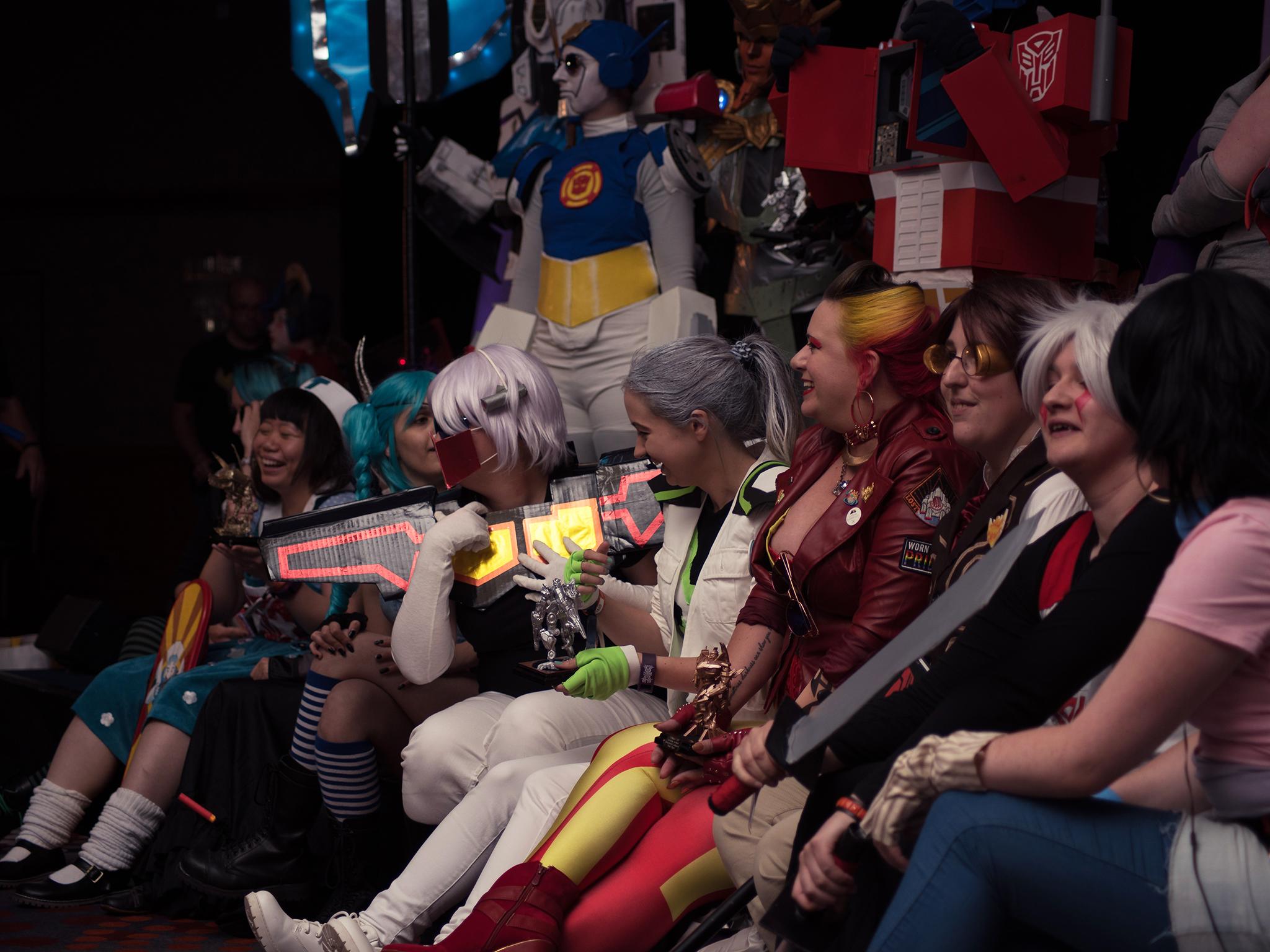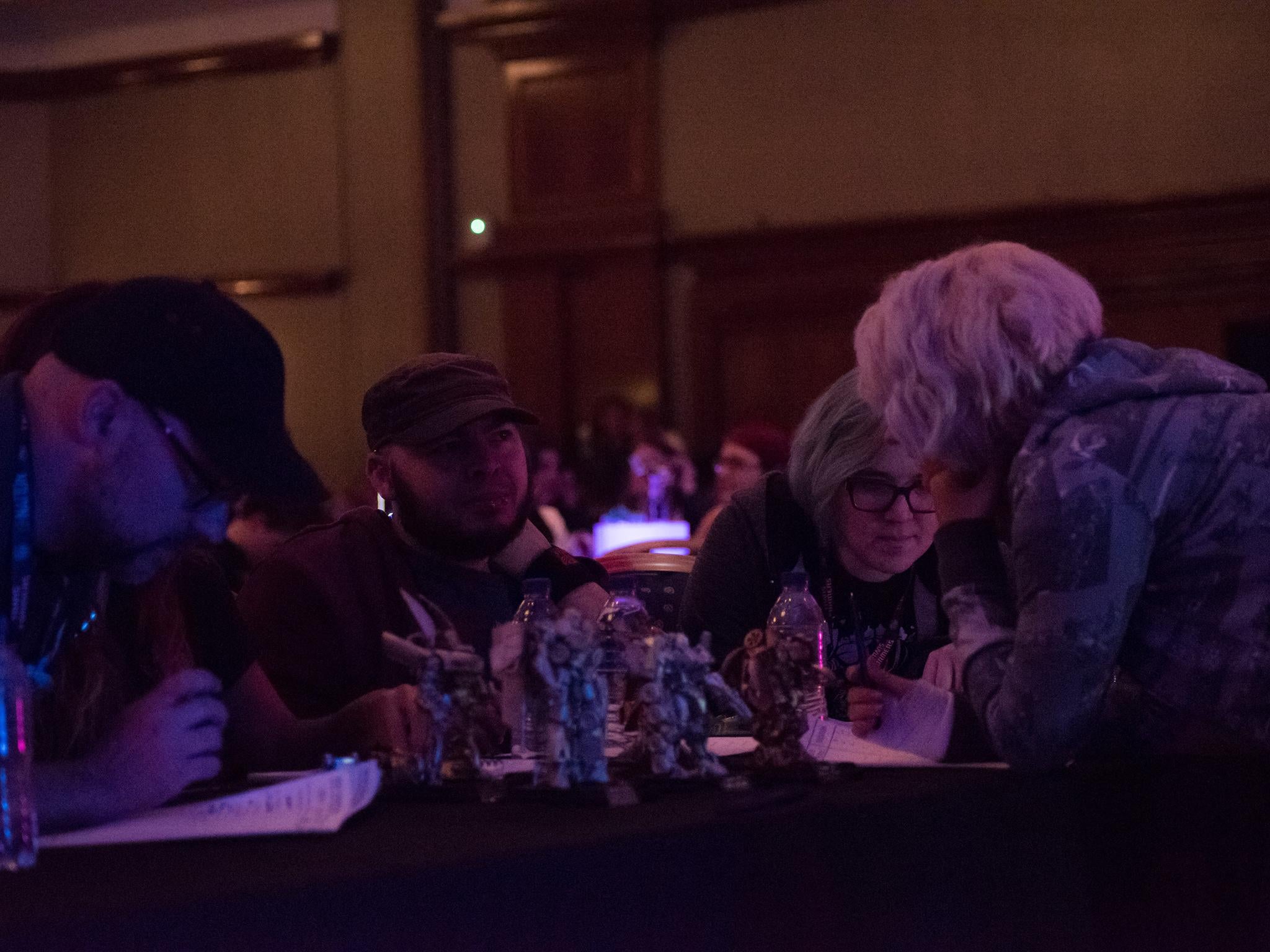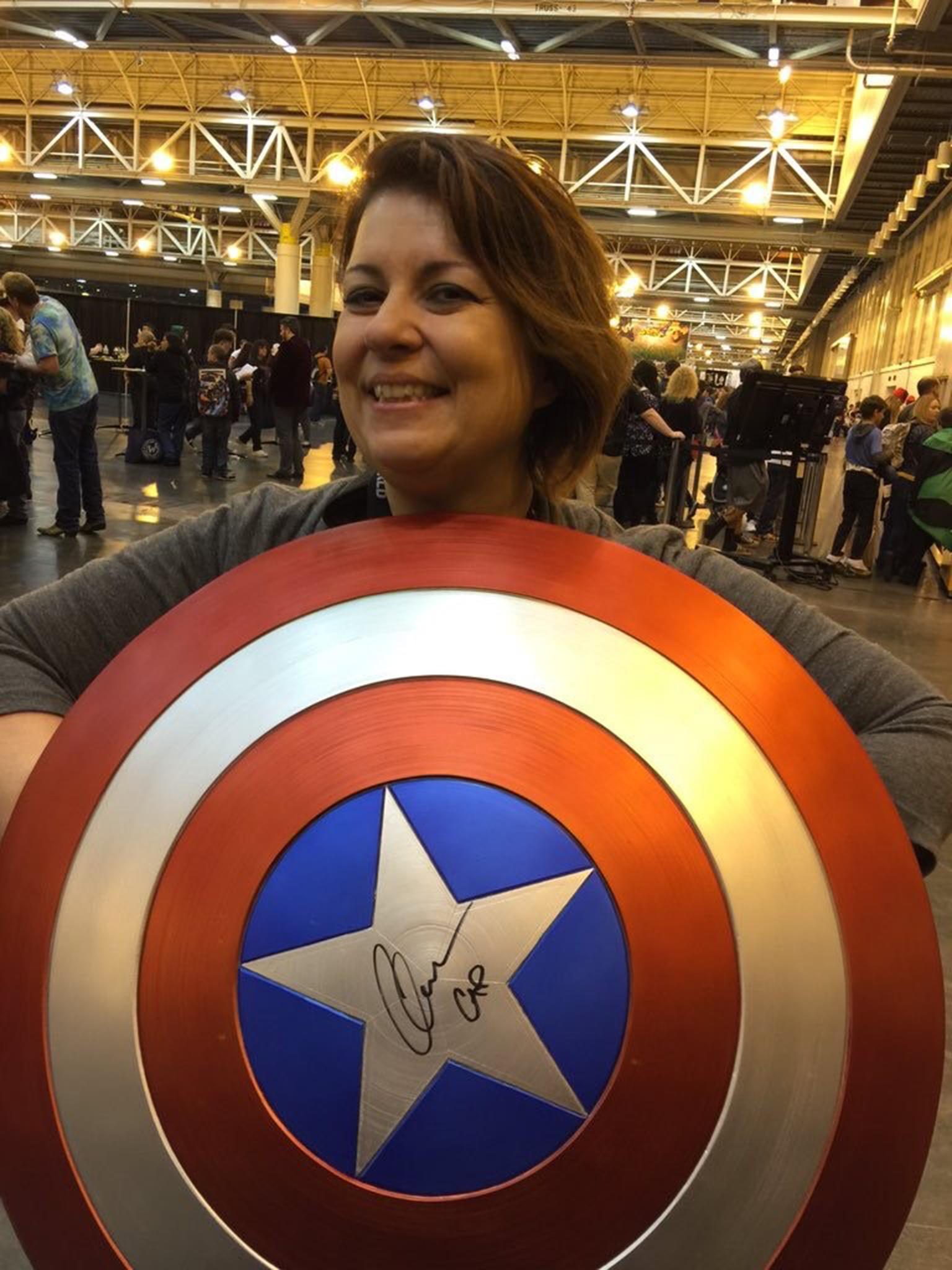I stand corrected: Women are geek culture collectors too
After writing on how the desire to hoard toys, books and comics was a male preserve – and experiencing the backlash – David Barnett sets the record straight. These are no Fake Geek Girls

Your support helps us to tell the story
From reproductive rights to climate change to Big Tech, The Independent is on the ground when the story is developing. Whether it's investigating the financials of Elon Musk's pro-Trump PAC or producing our latest documentary, 'The A Word', which shines a light on the American women fighting for reproductive rights, we know how important it is to parse out the facts from the messaging.
At such a critical moment in US history, we need reporters on the ground. Your donation allows us to keep sending journalists to speak to both sides of the story.
The Independent is trusted by Americans across the entire political spectrum. And unlike many other quality news outlets, we choose not to lock Americans out of our reporting and analysis with paywalls. We believe quality journalism should be available to everyone, paid for by those who can afford it.
Your support makes all the difference.Last month I wrote an article about collecting, and positing the admittedly highly unscientific theory that the desire to obtain, catalogue and hoard things – comics, coins, stamps, football programmes, toys – was a particularly male thing.
Oh, how wrong I was. In the days that followed the article’s publication, I was deluged on social media by women who collect. And not just, as I suggested in the first piece, “Capodimonte porcelain figurines, or shoes”, but the same sort of things that I implied were a very male preserve – toys, comics, books.
The Capodimonte and shoes line makes me wince now, and reads a lot more sexist than it did when I was writing it. But a unifying theme emerged from the women collectors who contacted me in the wake of the article – some angry, most simply pointing out my errors – that hadn’t occurred to me when I was putting together what I thought was a lighthearted piece.
Unwitting it might have been, but what I was doing was contributing to a narrative that has, for years, excluded women from pursuits that men consider their own… sometimes subtly, sometimes far more overtly.
Here are a few sample tweets that came my way:
@LockCade: Hi, I’m a woman who collects Transformers. I know hundreds of other women who are also Transformers fans/collectors. I also collect My Little Pony, Littlest Pet Shop, and anime figures. This mentality that only men collect stuff needs to stop.
@TierzaChels: I don’t have Capodimonte, or other decorative stuff. I collect Transformers, and voice actor autographs. Women collect. Our passion for comics, Transformers, Star Wars, TMNT etc is just as strong as men’s. #GetOverYourself
@NRothapfel: No, it’s not! I just think you know some very uninteresting women! I mean, porcelain figures and shoes?? My mantra is.. I collect therefore I am! New, old, bootleg, love it all! All sorts of stuff!! Toys, memorabilia, pop culture, comics, stuff, more stuff, ALL the stuff!!
The angrier tweets I could well understand. What I hadn’t considered when writing the first piece was the fact that women are constantly belittled, excluded and often attacked online if they publicly profess to share the especially geekish pursuits that some fandoms consider to be just for the boys.

Marjorie Carvalho is 45 and from Illinois, and was one of those who took me to task. I caught up with her for a longer chat about collecting and how women can face prejudice in the geek communities. Carvalho particularly collects anything to do with Star Wars and Marvel.
She says: “I am active in the collecting community and I think women are definitely on the level playing field. I feel very accepted in the community; I’ve never been made to feel anything otherwise. I think it helps that the collecting community is, as a whole, very good, and that women have been there from the start. I participate in a lot of activities in person and it’s always a welcoming and supportive community.
“There are also great online communities and it’s always a good thing to find new people to connect with. There are some collecting sites that allow the prejudice and misogyny to permeate the discussions. Fortunately there are only a handful of sites like that, it’s definitely not the norm. I would really hate for someone new to collecting or to a fandom to stumble across that and think that is what the hobby is about.”
If you’re a woman into anything like science fiction, comics, memorabilia or collectibles and you were online five or six years ago you can’t have failed to have got caught up in the “Fake Geek Girl” controversy.
Accusations were levelled at women who attended conventions or who regularly visited comic shops claiming they weren’t really interested in the culture in of itself, but were just pretending; the implication being that the end result of this was to make themselves appear more interesting to the male fans who were the “rightful” curators of such things.
It’s not hard to see how this was a symptom of the toxic masculinity which can sometimes infect geeky pursuits. There’s a sense of entitlement among some male fans of movies, animation, comic books etc which means that any upset to the delicate balance they perceive as existing in what they see as their territory is a major threat.
A lot of fandoms have traditionally been predominantly straight, white male-focussed – or at least, that’s the sector that shouts loudest, particularly online. Anything against this “norm” is not to be trusted, especially if it involves women, sexuality or race.
Thus there are howls of how diversity and liberalism is ruining the sacred cows of fandoms’ childhoods whenever a change is made… toys have been thrown out of prams with regards to the all-female reboot of the Ghostbusters movie; at suggestions that a black man, Idris Elba, could be in the running for the role of James Bond; at plans to make a film about a lesbian Batwoman.
The Fake Geek Girl row was a fairly weak and ultimately unsuccessful attempt to “put women in their place” and reassert male dominance, and though it was transparent and flimsy it is the sort of thing that women collectors see the ripples of affecting them several years down the line.
Carvalho says: “I think you see it online because people can hide behind their keyboards. I think the Fake Geek Girl thing started when what was traditionally geek culture became mainstream. There are new fans coming in and we need to welcome them.
“It all boils down to fear. There was a lot of distrust and fear when it became part of pop culture. People that had retreated to comics and toys were afraid of losing what was traditionally theirs. On one hand, I get it. You have a place where you feel safe and you can be yourself, and now there are ‘intruders’. We were all new to something once.“

Because of the way Twitter works, my original piece found its way into the timelines of a lot of women who are particularly active in the Transformers fandom – collectors of toys and memorabilia associated with the hugely popular morphing robots which have been successful since the 1980s across a multitude of platforms – cartoons, comics, movies.
This weekend sees TFNation, Europe’s largest Transformers fan convention, take place at the Hilton Metropole in Birmingham. This is the third year the convention has been run, and according to Steve Mapes from TFNation, the event has grown substantially ever year “in terms of attendance figures and the diversity – age, race, gender, sexuality, country of residence – of our attendees”.
Around 1,200 people are expected to attend this weekend.
Mapes has crunched some numbers for this piece, and says that while overall attendees this weekend break down as 68 per cent male, 26 per cent female and 6 per cent non-binary, those ratios change dramatically when you drill down to the core age ranges.
Looking at the 21 to 31-year-old age bracket there’s an almost even split between men (51 per cent) and women (45 per cent), with the balance identifying as non-binary. Most of the male attendees, says Mapes, are in the 31-46 age group.
What are male collectors and fans scared of? Is it a hangover from childhood fantasies of hanging signs saying “no girls allowed” on the treehouse door? Or could there also be a far more self-centred reason?
At the height of the Fake Geek Girl controversy, in December 2012, clinical psychologist Dr Andrea Letamendi explored the potential reasons for male anger at women getting involved in geek fandom in an article for themarysue.com, and one of the points she raised was quite literally the fear of losing out in the collecting stakes to women.
She wrote: “Growing up, many of us experienced our fandoms in the context of collections, acquisitions and serialised products. Our fandoms seem to manifest as measurable amounts of goods. Our vocabulary includes words like ‘exclusive’, ‘mint condition’, and ‘collectible’.
“Like it or not, we think of our fandom as serialised and limited. We’re a possessive lot and it’s not entirely our fault. The notion of an imposter – someone who doesn’t truly care about the personal meaning and value of the items – is threatening to us because they may take from our precious, vulnerable pot.
“The opposite is actually true if we think about intangible goods – the vast amount of knowledge across all geek genres from comic books to fantasy literature to video games. There’s such a large universe that the few imposters – if they really existed – are not realistic threats.”
In other words, the more women get involved, the greater the chance of missing out on scoring that vintage limited-edition Optimus Prime figure.
In my original article, I interviewed a psychologist to see if there was actually any science behind my theory that it is mainly men who collect things. There wasn’t, particularly, though there was some anecdotal discussion.
However, one of the respondents on Twitter – from an account called @TheMoonbase2, linked to a Transformers podcast run by two fans, offered an alternative take, saying: “There’s very little support within mammalia for that kind of behaviour. It does occur within birds but that’s a completely different phylogenetic group.”
They also pointed out that there’s a far deeper and longer-reaching tradition of men trying to disenfranchise women from ownership than the relatively recent arguments about who has the right to be a geek: “I’d argue collecting may have less to do with the male/female divide and relate to the socioeconomic status of women, how they were treated in terms of owning property and how even today many of the ideas that were huge staples only 50 years ago influence perceptions.
“Basically, women are only now having both the disposable finances and social freedom to own independent of a partner, and such collecting on the same scale or in the same fields as men have been free to indulge in for years is only in its escalation phase.”
“Escalation phase” suggests things are going to get better for women in the collecting world. Does Carvalho agree? “I think it’s improving in that women have support now if we call someone out,” she says. “They’re used to be a fear of being ridiculed, or not believed. That still exists, however, it’s lessened greatly, and there is very vocal support for women speaking up. I think men are more comfortable also using their voice in both support of women and in speaking up about other men being jerks to women.”
If I was being a jerk, albeit unintentionally, I’m glad to have been called out, and I’m more than happy to try to set the record straight when it comes to collecting. If there is a gender division, it’s down to a certain sector of male enthusiasts, and looks like it’s on its way out.
For more details on this weekend’s Transformer’s convention go to tfnation.com
Join our commenting forum
Join thought-provoking conversations, follow other Independent readers and see their replies
Comments